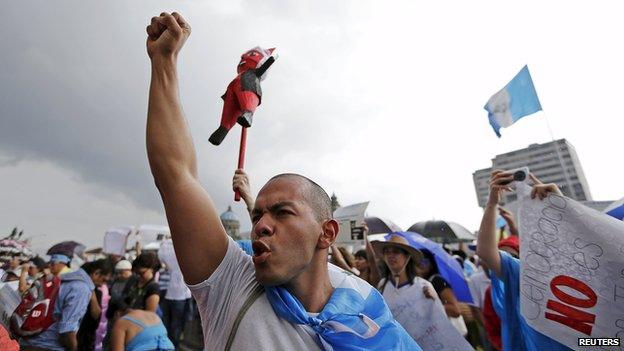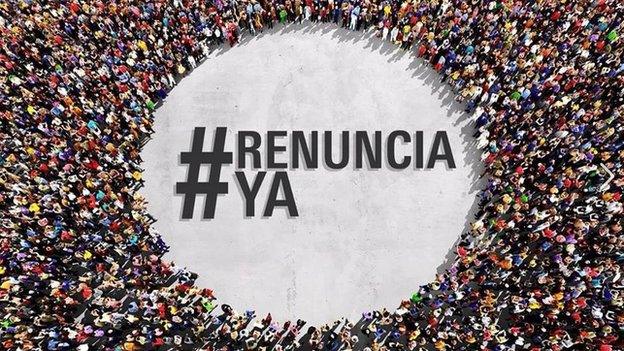How a peaceful protest changed a violent country
- Published

Guatemala is one of the most violent countries in the world, external, where corruption is rife, but a new political movement which started online has managed to hold a series of protests without a single violent incident - and it's starting to make a huge impact on the country's leadership.
Protests in Guatemala often lead to violence - for example, an anti-mining blockade ended with dozens injured last summer, external, and a recent protest by farmers reportedly led to two deaths, external. But a new movement has managed to organise huge street protests aimed directly at some of the country's most powerful politicians - without a single violent incident.
It all started in mid-April, when a UN anti-corruption agency CICIG issued a report that implicated several high-profile politicians, external including the vice president, Roxana Baldetti. The lawmakers were linked with organised crime, and the revelations generated an unprecedented level of public outrage.

For one young woman frustrated with her leaders, enough was enough. She felt that she had to do something, and created an event on Facebook inviting all her friends to go to the Guatemala City centre to ask for Baldetti's resignation with the hashtag #RenunciaYa, external (Resign Now). Within days, over 10,000 people said they would attend.
Quickly the organiser realised - together with her most committed friends, now known as "the group of seven" - that for the action to succeed, she had to guarantee that no one would be harmed. The group set a series of rules making clear that no political party or group was behind that event, instructing protesters to follow the law, and urging people to bring water, food and sunblock but not cover their faces or wear party political colours. Their demands? The resignations of Baldetti and Guatemalan President Otto Perez Molina.
To scrupulously avoid any of the outward signs of a political party, members of the group prefer not to be named in the media, although their identities are visible on Facebook. "We don't want our names to be the centre of attention," the young woman who started it all told BBC Trending.
"Our strategy was to be honest, to maintain order and to keep everything within the law," says another member.
And that strategy led to almost instant success. Tens of thousands of people took to the streets of Guatemala City, and Baldetti resigned a few days later, external (Molina remains in office). In a matter of days, #RenunciaYa achieved something almost unheard of in Latin America - a peaceful movement organised online which achieved real results.
"Over the past five or six years many protests have been announced on social media, but nothing was organised directly on Facebook," says Guatemalan professor Marco Fonseca of York University in Canada. Experts also noted the surprising social makeup of the #RenunciaYa protests - whereas most protests in Guatemala are mounted by poor indigenous groups, the Renuncia activists are mostly middle-class people from the capital.
After the success of its first action, #RenunciaYa organised a second protest earlier this month to push again for Molina's resignation. This time other cities joined in, along with Guatemalan expat communities around the world. Since then, the UN anti-corruption committee, external has reported on other cases and more than 20 government officials have stepped down - and some have been arrested. #RenunciaYa has expanded its mission by calling for election reforms, including caps on campaign spending.
"After we saw that we could put that level of pressure on the government, the energy among the people multiplied and we felt empowered," says one "group of seven" member. "I guess we lit a spark and the people walked into the fire."
#RenunciaYa is keeping to its neutral political stance. They inform their supporters about other protests not organised by the group, and have committed to hold several open discussions on what their next steps should be. But they realise that their reformist agenda is gathering steam and with elections scheduled for September, they have an opportunity.
"People are getting organised," one member says. "What we have to do is to push for changes, because if we don't achieve them now, it is going to be difficult to achieve them any other time."
Blog by Gabriela Torres, external, BBC Mundo
Next story: Only men at your event? This blog will shame you
Follow BBC Trending on Twitter @BBCtrending, external, and find us on Facebook, external.